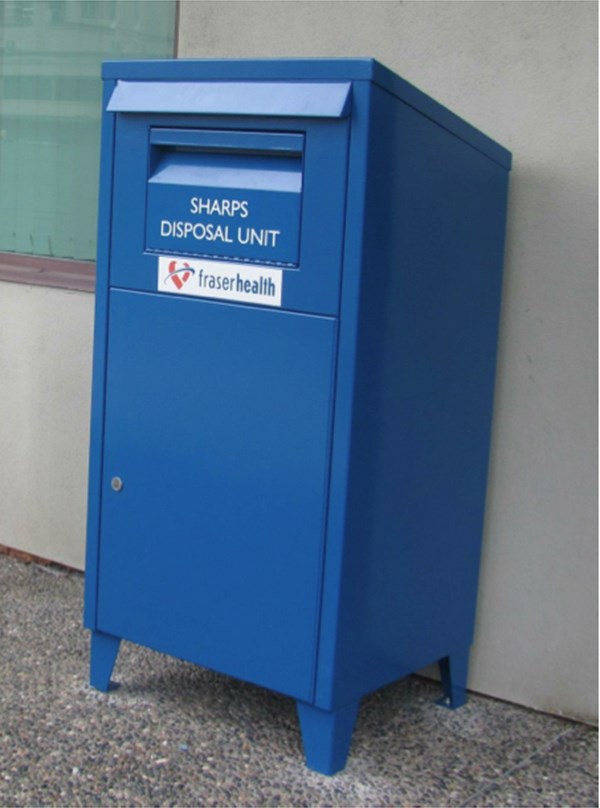Fraser Health will install needle drop boxes in the Tri-Cities and educate drug users about proper disposal and the public on how to respond if they find a needle to help curb the number of sharps left in the community.
“These do unfortunately end up as litter,” commented Ingrid Tyler, medical health officer for the Tri-Cities.
The promises come as the cities of Port Coquitlam and Coquitlam deal with concerns about needles being found in public places and as health authorities endeavour to combat the opioid overdose crisis, which took 21 lives in Coquitlam and seven in Port Coquitlam last year.
At a meeting of the 3030 Gordon task group Friday, Fraser Health outlined a plan to deal with drug use in the community, including establishing suboxone treatment for opioid addiction, which is currently not available here, and ramping up needle collection and enhancing public awareness about the issue.
NEEDLE CONCERNS
However, it became clear that the cities are struggling with the impact of harm reduction strategies aimed to prevent the spread of HIV. With injection drug users needing three or four needles a day and the BC Centre for Disease Control policy allowing people to take what needles they need to avoid sharing, Fraser Health distributed 77,000 needles last year in the Tri-Cities.
Fraser Health reports that it also collected 78,000 needles last year — 1,000 more than it distributed — but it’s not known exactly how many needles are being distributed because pharmacies also give them out.
Port Coquitlam has reported collecting several dozen needles, and since last October has spent nearly $7,000 on staff time checking for needles in parks and natural areas, although city bylaw officers reported to The Tri-City News they have seen an improvement in the situation in the last few months as needle sweeps have been expanded.
Still, some members of the task force established to look into 3030 Gordon issues want Fraser Health to do a better job of retrieving needles and perhaps not give out so many.
“It used to be a needle exchange, but that model seems to have gone by the wayside,” commented Coun. Terry O’Neill, the task group’s co-chair, who argued for fewer needles or better control of the of needles distributed to drug users in the community.
HARM REDIRECTION
His comments were echoed by Coquitlam Mayor Richard Stewart, who said the harm reduction program isn’t effective if needles are being found in public places.
“Obviously it’s only harm reduction if the needle comes back. If the needle is in a park, it’s harm redirection,” said Stewart.
However Fraser Health’s Tyler, who was joined by Katherine Moriarty, the regional coordinator for harm reduction, said the health authority is working on the problem. A coordinator was recently hired to do more sweeps of the area and solutions such as mail-box sized drop boxes at pharmacies or public health units are being considered, along with smaller drop boxes in other areas known to be frequented by drug users.
One large box placed outside a health unit in needles can collect as many as 3,000 needles and there are reports of a 98% reduction in sharps in a 200 metre radius with these sorts of collection boxes.
“It allows for 24/7 disposal,” said Tyler, who said drug users can store their used needles in a special box they get when picking up their needle supply, and then drop them off at a collection sites.
But the health authority representatives also suggested that people shouldn’t be so afraid of needles because the risk of contracting disease from a needle stick injury is low.
“The level of concern is out of proportion to the risk as reported in the literature,” Tyler said, although she acknowledged it can be stressful to be stuck by a needle and it usually requires a trip to the hospital for treatment.
LACK OF TREATMENT
Concern about the lack of treatment for opioid addiction was also raised at the meeting by task group chair Coun. Chris Wilson, who said the region seems to be lacking in options.
“Without proper treatment, enforcement isn’t a very good option,” he said.
The task group was told that opioid agonist therapy, such as suboxone or methadone, is more effective for opioid addiction than detox and Fraser Health is working to establish a program in the Tri-Cities so people don’t have to leave the area for help.
Tyler said Fraser Health is looking to partner with municipalities to get information out to the public where needles can be disposed, such as on a city website, and will look at collecting data about where needles are being left so they can be picked up.
People who find discarded needles can call the Stride With Purpose health van at 604-351-1885 which will arrange collection within 24 hours.



